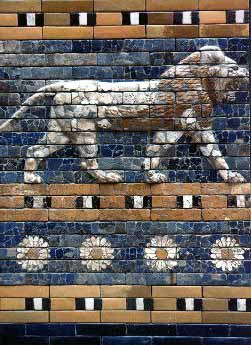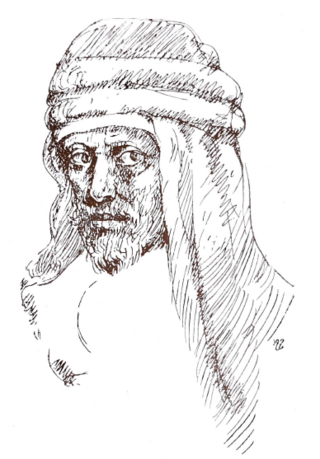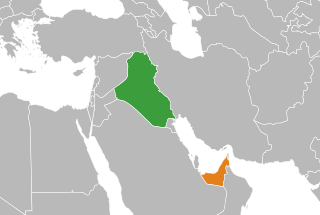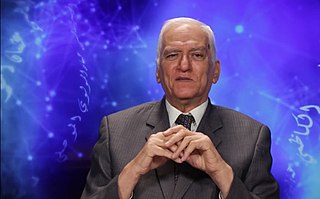
The music of Iraq or Iraqi music,, also known as the music of Mesopotamia, encompasses the music of a number of ethnic groups and musical genres. Ethnically, it includes Mesopotamian Arabic, Assyrian, Kurdish and the music of Turkmen, among others. Apart from the traditional music of these peoples, Iraqi music includes contemporary music styles such as pop, rock, soul and urban contemporary.

Sheikh Zayed bin Sultan Al Nahyan was an Emirati royal, politician, philanthropist and the founder of the United Arab Emirates. Zayed served as the governor of Eastern Region from 1946 until he succeeded Sheikh Shakhbut as the ruler of Abu Dhabi in 1966, and then as the first president of the United Arab Emirates while he retained his position as Abu Dhabi's ruler from 1971 until his death in 2004. He is revered in the United Arab Emirates as the Waalid al-Ummah, credited for being the principal driving force behind uniting the seven Trucial States to found the Union of the United Arab Emirates.

Adnan al-Pachachi or Adnan Muzahim Ameen al-Pachachi was a veteran Iraqi and Emirati politician and diplomat. Pachachi was Iraq's Permanent Representative to the United Nations from 1959 to 1965 and Minister of Foreign Affairs of Iraq from 1965 to 1967, during the Six-Day War with Israel; he again served as Permanent Representative to the UN from 1967 to 1969. After 1971, he left Iraq in exile and became an Emirati Minister of State and political advisor to United Arab Emirates president Sheikh Zayed bin Sultan Al Nahyan. Following the 2003 U.S. invasion of Iraq, Pachachi was an important figure in Iraqi politics, often described as Iraq's elder statesman. He rejected the role of president in the Iraqi Interim Government.

Abū al-Ṭayyib Aḥmad ibn al-Ḥusayn al-Mutanabbī al-Kindī from Kufa, Abbasid Caliphate, was a famous Abbasid-era Arabian poet at the court of the Hamdanid emir Sayf al-Dawla in Aleppo, and for whom he composed 300 folios of poetry. His poetic style earned him great popularity in his time and many of his poems are not only still widely read in today's Arab world but are considered to be proverbial.

Naseer Shamma is an Iraqi musician and oud player.

Omar Bashir is an Iraqi-Hungarian musician. He is the son of Munir Bashir, who is widely considered to be one of the most important virtuosos in the history of the oud and a master of the modal tradition of Arabic maqam.
The history of the Jews in the United Arab Emirates describes the historical and modern presence of Jews over the millennia in the Middle East and the recorded meetings with Jewish communities in areas that are today in the geographic territories of the United Arab Emirates.

Nujoom Alghanem is an Emirati poet, artist and film director. She has published eight poetry collections and has directed more than twenty films. Alghanem is active in her community and is considered a well established writer and filmmaker in the Arab world. Her achievements in the arts have been recognized both nationally and internationally. She is the cofounder of Nahar Productions, a film production company based in Dubai. Currently she works as a professional mentor in filmmaking and creative writing, as well as a cultural and media consultant.

According to the 2005 census, Christians accounted for 9 percent of the total population of the United Arab Emirates; estimates in 2010 suggested a figure of 12.6%.

Ali Bader is an Iraqi novelist and a script writer, regarded as the most significant writer to emerge in Arabic world in the last decade. author of eighteen works of fiction, and several works of non-fiction. His best-known works include Papa Sartre, The Tobacco Keeper, The Running after the Wolves, and The Sinful Woman, several of which have won awards. His novels are quite unlike any other fictions in Arabic world of our day, as they blend character study, social criticism, philosophical reflection, and explicit language. Bader was born in Baghdad, where he studied western philosophy and French literature. He now lives in Brussels.

Iraqi-Emirati relations are foreign relations between the Republic of Iraq and the United Arab Emirates. Iraq has an embassy in Abu Dhabi and a consulates general in Dubai, while the United Arab Emirates has an embassy in Baghdad.
Iraqis in the United Arab Emirates have a population exceeding 200,000, closer estimates report a total of 250,000 Iraqis in the Emirates. Since its independence, Iraqis have contributed in the development of UAE, as engineers, politicians and in other fields. Most notably Adnan Pachachi who was appointed as Minister of State in the first Government of the Emirate of Abu Dhabi. Pachachi is known for his role in submitting the UAE's application for membership in the United Nations. In a meeting with Prime Minister of Iraq, Mustafa Al-Kadhimi, Mohamed bin Zayed Al Nahyan stated that "Iraqis have contributed in building the UAE, and there are many of them who worked, built, developed and helped build the Emirates, and we mention this credit to them, whether engineers, doctors, or even politicians and others. There are still many Iraqis living in the UAE, and they are credited.”
The Arabic Oud House is a music school for the traditional Arabic lute called oud in Cairo, Egypt. Founded by Iraqi oud player Naseer Shamma, the school has trained a new generation of oud players and subsequently opened branches in the United Arab Emirates, Iraq, Algeria and Sudan.

Habib Yousef Abdullah Al Sayegh was an Emirati poet and writer. He was born in Abu Dhabi and obtained his Bachelor’s degree in Philosophy in 1977, as well as a Master’s degree in Comparative Linguistics and Translation in 1998 from the University of London. He worked in the fields of media and culture, as he was the Editor-in-Chief of Al Khaleej Newspaper. He was the Chair of the Board of Directors of the Emirates Writers Union, and the first Khaliji to become Secretary-General of the Arab Writers Union.
Mohamed Al-Rufrafi, an Arab poet, writer, media and translator living in exile, born in Tunis, 2 December 1950, resided in several countries before settling in France in 1984. In parallel with the journalistic work, he devoted his work to writing, translating and various cultural and artistic events, from Paris and through European and Arab cities.
Youssef Izz al-Din Ahmad al-Samarrai was an Iraqi poet and university professor. He was born and studied in the city of Baqubah. He worked as a primary teacher at the Primary Teacher's House, then joined the Faculty of Arts at Alexandria University where he obtained a BA in Arabic language and literature. Youssef Izz al-din has continued his studies there, receiving a master's degree, then a doctorate from the University of London. He was appointed as a teacher of modern Arabic literature at the College of Arts at the University of Baghdad. He was assigned to the iraqi scientific academy in 1961, then a general director of guidance at the ministry of culture. He was a member of the royal society of literature in London, and the scientific academy in Cairo, Damascus, Jordan, and Iraq. He has many poetry collections and a large number of books, studies and lectures that he delivered. He died in Britain.

Rashid Yassin Abbas Al-Rabaie was an Iraqi journalist, poet, literary critic, and university professor. He was born in Baghdad under Mandatory Iraq, where he completed his primary and secondary education. He then pursued a bachelor's degree in theatre science at Krastyo Sarafov National Academy for Theatre and Film Arts in Bulgaria, and later obtained a postgraduate degree in philosophy and aesthetics from Sofia University.

Imad Abdul Salam Raouf was an Iraqi historian, investigator, and thinker.
Rohi al-Khammash (1923–1998) was an Iraqi musician and composer of Palestinian origin who played a major role in the development and preservation of Iraqi music and the flourishing of the musical movement in Iraq. He founded artistic groups that greatly contributed to the preservation and development of Iraqi artistic heritage, such as the Muwashahat Group in 1948, whose name was changed to “the Sons of the Tigris Group” in 1961, the Iraqi Chanting Group, and the Baghdad Quintet, which later became known as the Quintet of Fine Arts, among other groups that left a distinct mark on art, singing, and Iraqi music during the second half of the twentieth century. He composed the anthem "O God of the Universe," which is a religious supplication associated with the traditions and rituals of Ramadan in Iraq.

Ali AlShaali is an Emirati poet, publisher, and cultural activist. He published a number of poetry collections, including "A Bee and a Rababa," "Faces and Weary Others," "Earth Has but One Soul," "Show Me the Way to the Cave," and "The Grass Resembles Us, So Do the Clouds." He also published a novel titled "The Alive Live Being" and a collection of essays titled "Chambers That Have Windows."














